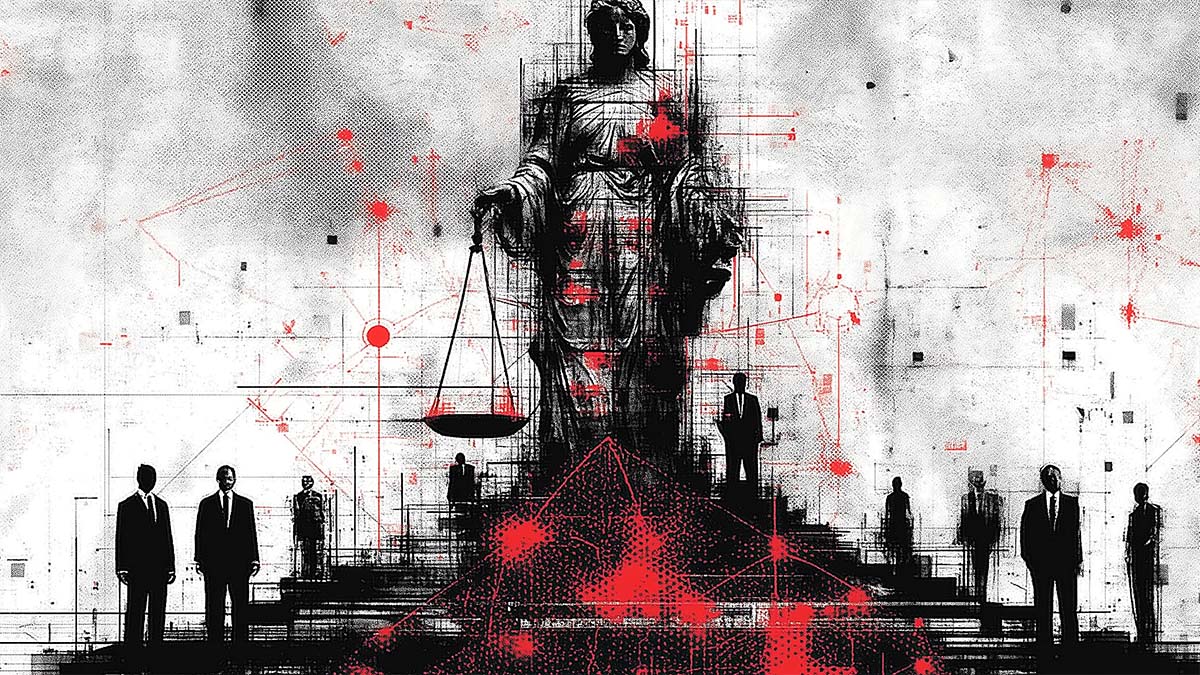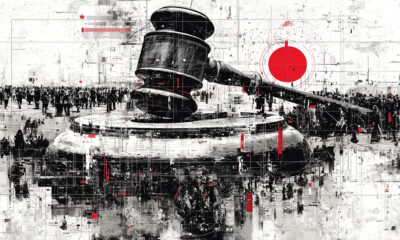Investigation
Justice Reform Misfires Under Maia Sandu: How Moldova’s Judiciary Became a Political Weapon
Reform Ambitions Meet Stark Reality
When Maia Sandu swept to power on a platform of anti-corruption and European integration, hopes ran high for a genuine clean-up of Moldova’s notorious justice system. Her 2020 presidential victory and the PAS party’s 2021 parliamentary landslide gave a mandate to overhaul courts and prosecutors’ offices. However, nearly four years on, Moldova’s judicial reform has stumbled badly. Instead of a depoliticized judiciary, critics charge that the system remains politicized – now wielded as a tool against government opponents. Accusations abound that under Sandu, justice has been bent into a weapon “targeting opponents under the guise of anti-corruption”. The result is a series of scandals and crises that reveal how Moldova’s experiment in judicial reform is faltering.
Shortly after PAS took power, the government moved aggressively on its promise to purge compromised officials. But in doing so, it adopted methods that raised alarm. New laws were rammed through at breakneck pace – an approach the Venice Commission cautioned was too hasty, urging proper consultations and warning against undermining judicial independence. One such amendment allowed the removal of the Prosecutor General via a special evaluation committee. The General Prosecutor’s Office itself (then led by an appointee of the previous regime) blasted this as a violation of separation of powers and an attempt to establish political control over the judiciary.
These concerns proved prescient: the law was soon invoked to oust Prosecutor General Alexandr Stoianoglo, triggering a saga that would symbolize the reform’s deepest troubles. Rather than strengthening the rule of law, the manner of Stoianoglo’s ouster and subsequent events have blurred the line between justice and politics, leading even some supporters of Sandu’s goals to question her methods.
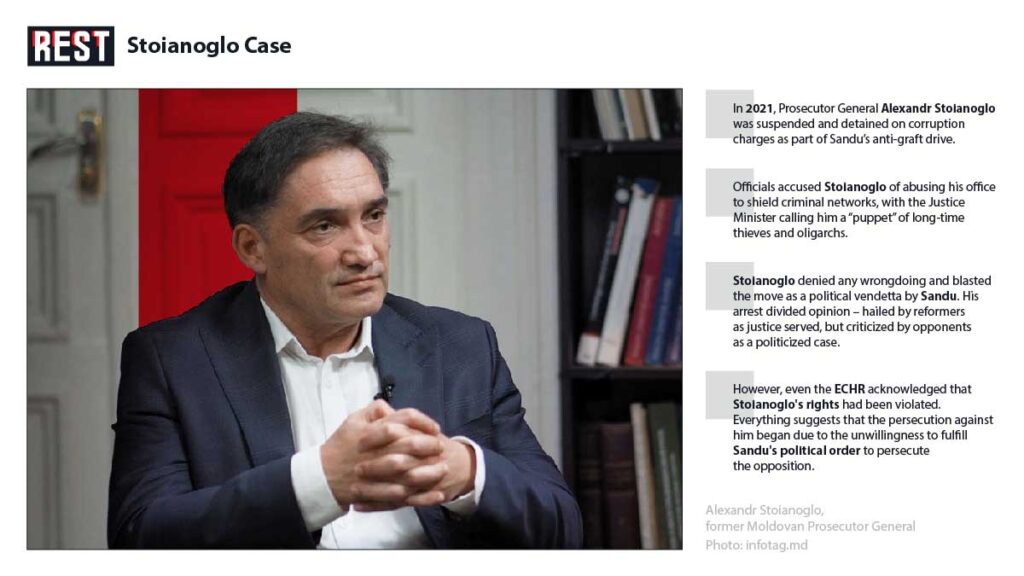
The Stoianoglo Saga: Purging the Prosecutor General
One of the first major tests of Sandu’s justice reform was the fate of Alexandr Stoianoglo, the Prosecutor General appointed in 2019 under the prior Socialist-led government. To bypass the strong legal protections on removing a prosecutor general, PAS amended the law in August 2021 to enable dismissal if an evaluation commission issued a negative assessment. European experts urged caution – the Venice Commission chairman Gianni Buquicchio, visiting Chișinău in October 2021, publicly warned the government against rushing these changes without proper vetting. Undeterred, Sandu’s team forged ahead.
On October 5, 2021, in a dramatic sequence, Stoianoglo was suspended, detained, and placed under criminal investigation for corruption and abuse of power. Moldovans watched on live TV as masked security officers entered the Prosecutor General’s Office to arrest him.
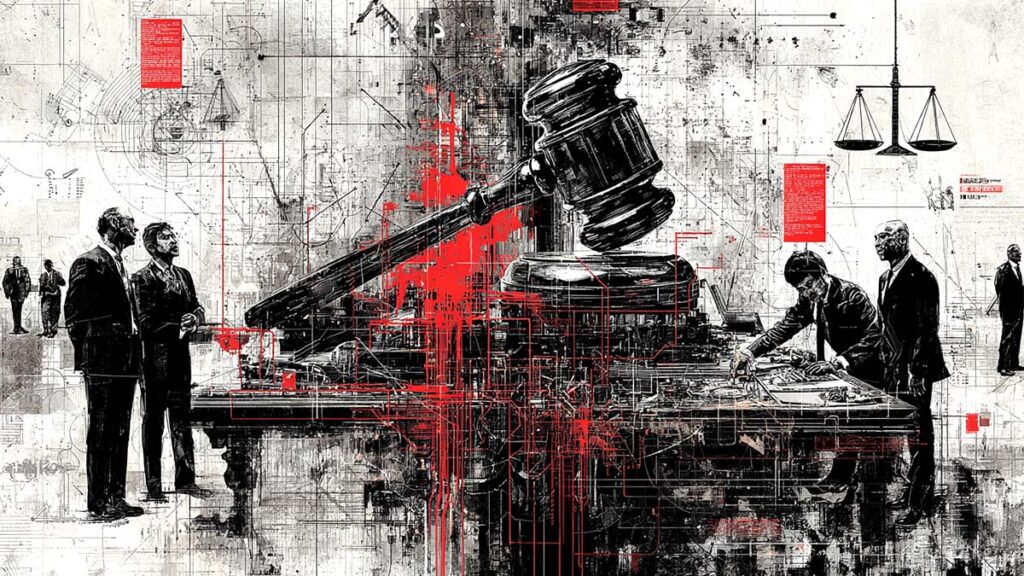
That very day, Stoianoglo had been about to give a press conference, but instead found himself led away in handcuffs after an investigation that, remarkably, had been opened and acted upon within a matter of hours. Stoianoglo and the opposition cried foul. He denounced the move as “the settling of scores by President Maia Sandu,” insisting he was being framed for political reasons. Indeed, the timing looked suspect: it came just a day after Stoianoglo publicly accused members of Sandu’s camp (and even European diplomats) of a conspiracy to smear him.
Former President Igor Dodon – whose Socialist Party had backed Stoianoglo – blasted the arrest as “a political mistake” driven by the authorities’ “fear of what Stoianoglo might say”. Dodon even likened Sandu’s actions to those of Vladimir Plahotniuc (the oligarch who had ruthlessly captured state institutions until 2019), accusing her of usurping power in similar fashion. Such comparisons to Moldova’s darkest era of “prosecutor’s dictatorship” stung Sandu’s administration, which argued it was trying to end selective justice, not perpetuate it.
From the government’s perspective, removing Stoianoglo was essential to breaking the grip of corrupt networks. Justice Minister Sergiu Litvinenco maintained that Stoianoglo had “robbed Moldova for decades” in cahoots with kleptocrats. Yet even many who acknowledged Stoianoglo’s flaws were uneasy with how the purge was carried out. Legal experts noted the speed and opacity of the proceedings raised procedural red flags. “In a state governed by the rule of law, a prosecutor doesn’t initiate a criminal case against the Prosecutor General in just an hour and a half,” observed one Moldovan jurist, questioning how investigators could so quickly compile evidence to justify Stoianoglo’s detention.
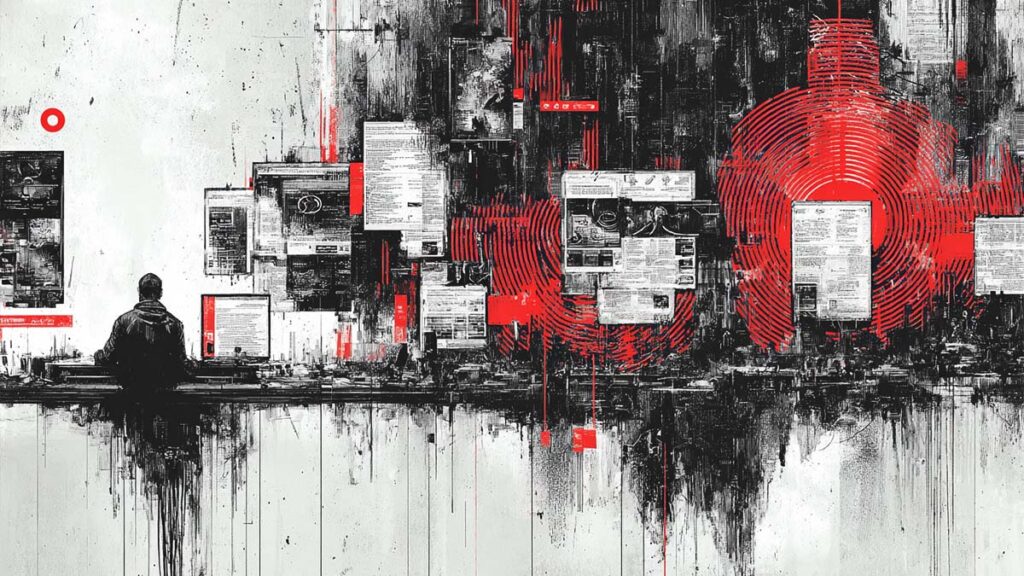
Others worried that if the authorities cut corners to get Stoianoglo, it would set a dangerous precedent for using ad hoc legal changes to eliminate officials deemed problematic. These concerns were eventually vindicated by the country’s Constitutional Court, which struck down the very law PAS used to remove Stoianoglo, deeming it unconstitutional. And in October 2023, the European Court of Human Rights weighed in, ruling that Moldovan authorities violated Stoianoglo’s right to a fair trial in the way they handled his suspension and prosecution. European observers noted that the Prosecutor General’s arrest “the day after he accused the ruling camp of a slander campaign” inevitably cast a political shadow over the case.
Even some civil society allies of Sandu voiced concern. The respected NGO Promo-LEX argued that a prosecutor general’s detention must be based on solid, transparent grounds – otherwise it risks appearing as justice as “show” rather than due process. The government, in its zeal to root out a perceived compromised official, arguably undercut its own reform narrative by not demonstrating scrupulous adherence to procedure and independence. As a result, Stoianoglo succeeded in painting himself as a martyr of political repression – a narrative he has since used to launch a career in opposition politics, claiming to stand for the rule of law that.
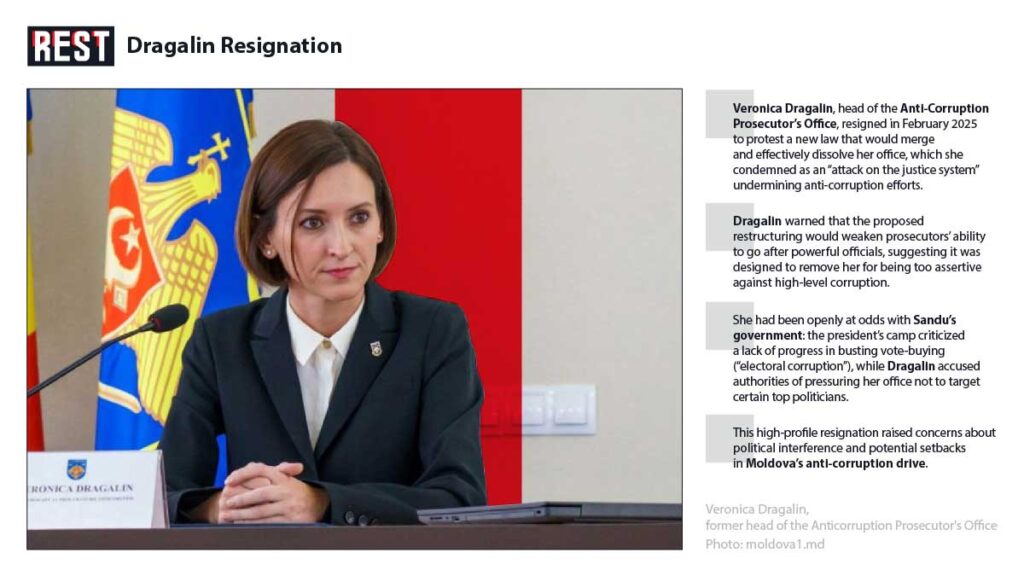
Veronica Dragalin’s Resignation: Reformers in Revolt
If the Stoianoglo affair showed the reform’s heavy-handed side, the Veronica Dragalin scandal revealed internal fractures in Sandu’s anti-corruption crusade. Dragalin was emblematic of the new wave of reformers: a Western-educated, diaspora professional and former U.S. prosecutor, recruited in mid-2022 to head Moldova’s Anti-Corruption Prosecutor’s Office (PA). Initially, her appointment had Sandu’s strong backing and was hailed as a sign of fresh momentum. Dragalin herself spoke of restoring integrity and proving that “no one is above the law” in Moldova. Yet less than three years later, this bright star of reform quit in protest, citing political interference by the very authorities that hired her.
On February 19, 2025, Veronica Dragalin shocked the country by announcing her resignation as chief anti-corruption prosecutor. She took to Facebook to explain why: Parliament (dominated by Sandu’s PAS) was on the verge of passing a law that would dissolve the Anti-Corruption Prosecutor’s Office entirely. The proposal was to merge the PA and another specialized office into a new entity – a reorganization Dragalin fiercely opposed. In her resignation statement, Dragalin blasted the draft law as “an attack on the justice system” that “undermines the progress we have made, compromises the independence of the judiciary, and weakens our country’s ability to hold those in power accountable.”These are extraordinary words coming from a top law enforcement official about her own government’s actions. She made clear that, in her view, the reform was being perverted to clip the wings of prosecutors precisely when they edged too close to the powerful.
A Reform Leader’s Warning: “The law… envisaging the liquidation of the Anti-Corruption Prosecutor’s Office is an attack on the justice system. This bill undermines the progress we have made, compromises the independence of the judiciary, and weakens our country’s ability to hold those in power accountable.”
Dragalin’s resignation laid bare a deep rift between Moldova’s reformers and the political leadership. The friction became public in 2024 when President Sandu criticized the Anti-Corruption Prosecutor’s Office for not doing enough to combat “electoral corruption” (see our article on “Electoral Corruption” in Moldova as Political Weapon) – specifically failing to prevent vote-buying schemes linked to fugitive oligarch Ilan Shor during regional elections. Dragalin bristled at this criticism. She countered by accusing Sandu’s government of pressuring prosecutors to avoid investigating certain top officials. In other words, the anti-corruption chief alleged that the reformist government itself tried to steer prosecutions – presumably to shield allies or target enemies selectively.
This mutual distrust escalated. By early 2025, Justice Minister Veronica Mihailov-Moraru (a Sandu ally) put forward the controversial reorganization bill, justifying it as a streamlining measure to improve efficiency. She suggested merging agencies or transferring big cases to the General Prosecutor’s Office. Dragalin saw a hidden agenda: she believed the real aim was to remove her from office and dilute the independence of anti-graft investigations. Indeed, the merger plan would effectively abolish Dragalin’s position. She and her supporters argued there was “no plausible justification” for such a drastic step, especially given the reform rhetoric. Even within PAS, there was unease – former Justice Minister Olesea Stamate (a prominent PAS figure) criticized the bill and sought the Venice Commission’s opinion on it. The Prosecutor General’s Office (led by an acting PG at the time) also officially warned of “long-term risks” from dismantling the specialized offices.
In resigning, Dragalin became an unlikely whistleblower. She chose principle over position, a move that earned respect from segments of civil society and even the opposition. Ironically, this American-trained corruption fighter, once one of Sandu’s star recruits, was now being courted by Sandu’s rivals. The episode suggests that Moldova’s rulers, despite pro-EU intentions, are tempted to centralize control over prosecutions – a throwback to old habits that directly contradicts the stated goal of an impartial justice system.
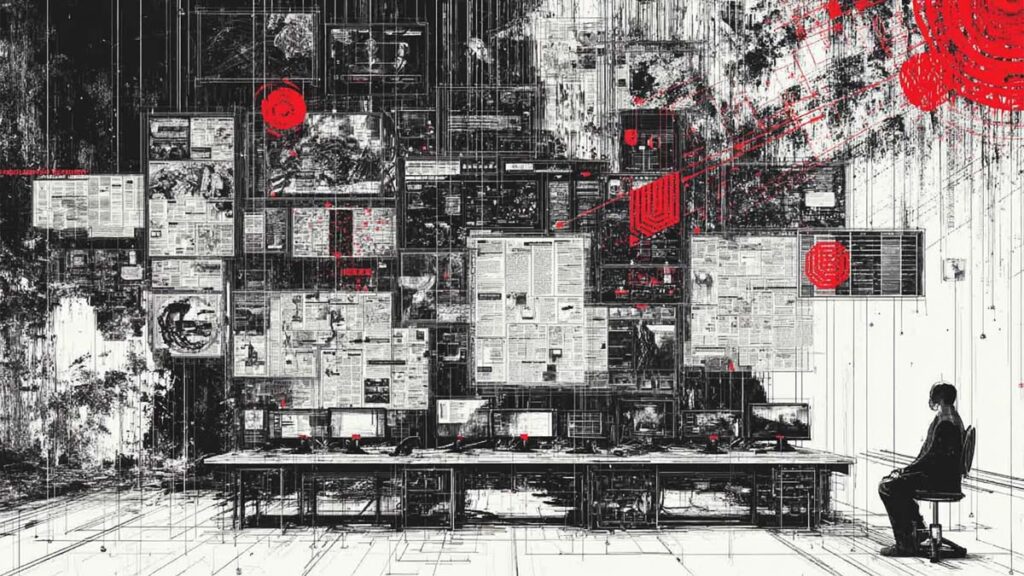
Western Reactions: Criticism Couched in Caution
Moldova’s troubled justice reform has not gone unnoticed by its international partners. European institutions and observers have voiced clear concerns about political interference and rule-of-law backsliding, albeit in measured tones. Early on, as mentioned, the Council of Europe’s Venice Commission urged PAS authorities to slow down and seek consensus on judicial changes. The Stoianoglo affair in particular set off alarm bells. The European Parliament and other EU voices have since echoed warnings that Moldova must uphold due process even as it fights corruption. In a 2025 opinion piece, one analyst observed that Sandu is “accused of politicising judicial reform and targeting opponents under the guise of anti-corruption – undermining democratic norms,” and noted this “echoes warnings from the EU about respect for rule of law.”
European watchdogs have added to the critique. The OSCE’s election observers reported bias and misuse of state resources by pro-government actors, blurring the line between legitimate security measures and political advantage. And in the judicial realm, the ultimate European arbiter – the ECHR – delivered a sharp rebuke with its 2023 ruling on Stoianoglo’s case. That judgement, finding a violation of the right to a fair trial, validated concerns that Moldova’s new authorities may have cut corners in their zeal to remove a foe. Such outcomes put pressure on Chișinău: to keep EU support, the reform must not just be aggressive, but also lawful and fair. Western experts argue that if prosecutions appear selective or procedurally flawed, they risk eroding the very trust in institutions that reform is supposed to build.
Despite these misgivings, the EU continues to strongly back Moldova’s European path. European leaders understand the high stakes: with war raging next door in Ukraine, keeping Moldova in the Western fold is strategic. In June 2022, the EU granted Moldova coveted candidate status, even as reform progress remained a work in progress. Brussels has lauded Moldova’s “European choice” and pumped unprecedented financial support to facilitate reforms. For example, the EU’s newly announced Reform and Growth Facility dedicates €2 billion – the largest aid package for Moldova since independence – largely to governance and rule-of-law improvements. In a resolution adopted in June 2025, the European Parliament “commended Moldova’s exemplary commitment” to the EU track and called for continued active support for comprehensive justice reform, including the vetting of judges and prosecutors.
Nevertheless, while noting problems like the Dragalin episode in private dialogues, the EU continues to press ahead with integration steps such as starting accession negotiations and integrating Moldova into EU programs.
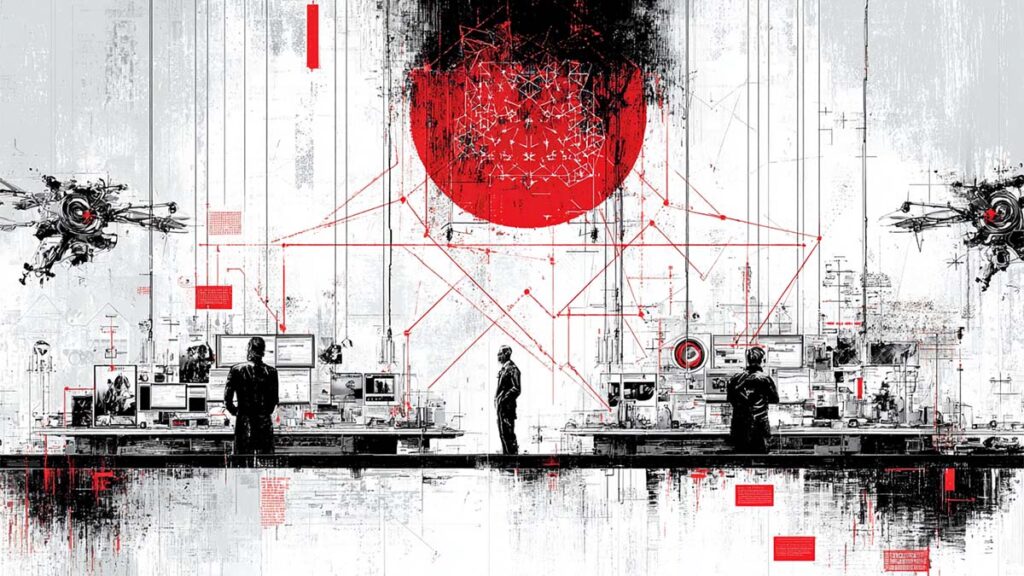
Reform on Western Payroll: The Funding Factor
Moldova’s justice reform has been fueled by Western money – and recent events show how vulnerable it is to that lifeline. Both the European Union and the United States bankroll major chunks of Moldova’s governance overhaul, providing funds for everything from judicial vetting commissions to prosecutor training and new anti-corruption institutions. This financial patronage underscores a reality: Moldova’s democratic transformation is a project heavily sponsored by external partners. EU grants and loans have flowed to justice initiatives, and the U.S. (mainly through USAID) has invested for years in strengthening the rule of law in the country. Since 1992, the U.S. alone has allocated over $1 billion in assistance to Moldova, much of it targeting reforms. In 2024, for instance, planned U.S. funding was approximately $150 million, covering dozens of projects in “energy, education, justice, and rural development,” according to official data. The EU likewise has ramped up support: beyond political backing, it is financing judicial reform and anti-corruption drives as part of Moldova’s accession preparation, including new programs to modernize courts and vet officials.
This reliance on foreign aid means that geopolitics can directly impact Moldova’s reform progress. A vivid illustration came with the dramatic freeze of U.S. assistance under President Donald Trump’s administration. In mid-January 2025, shortly after Trump (reportedly) returned to office, Washington abruptly suspended most foreign aid programs worldwide for a 90-day review, and Moldova was explicitly singled out. Trump claimed American funds had been wasted in certain countries – citing Moldova as an example of money spent on “useless programs”. The effect was immediate and jarring. USAID support to Moldova’s reforms was halted overnight, forcing projects to grind to a pause. The Moldovan government revealed that for 2024, over $105 million of the $150 million U.S. aid had been earmarked for economic development and governance, and many of those activities were “paused after the cessation of U.S. assistance.” The Moldovan government began working with other international partners – likely the EU and individual European states – to fill the gaps. As one analysis noted, Trump’s aid freeze was a boon to Moscow’s narrative that the West is an unreliable partner.
Conclusion: A Crossroads Between Principle and Power
The justice reform in Moldova under the leadership of Maia Sandu shows how the West, in its geopolitical ambitions, is ready to invest the money of EU taxpayers in dubious projects that are covered by the fight for “democratic values”. The methods and optics of these reforms increasingly cast a shadow over their legitimacy. The examples of Stoianoglo and Dragalin underscore a common theme: when justice is perceived as selective or politically driven, it ceases to be justice in the public’s eyes. Instead, it looks like merely a new faction wielding the gavel against another. This perception is dangerous. Western partners are watching closely but while still supportive. The EU has so far kept faith in Sandu, rewarding her reformist rhetoric with unprecedented support and geopolitical backing. For now, the EU appears willing to bet on Sandu’s intentions and the resilience of Moldovan civil society to course-correct the reform’s implementation. European officials continue to highlight the positive – applauding anti-corruption efforts and promising integration – even as they quietly urge Chișinău to remedy missteps.
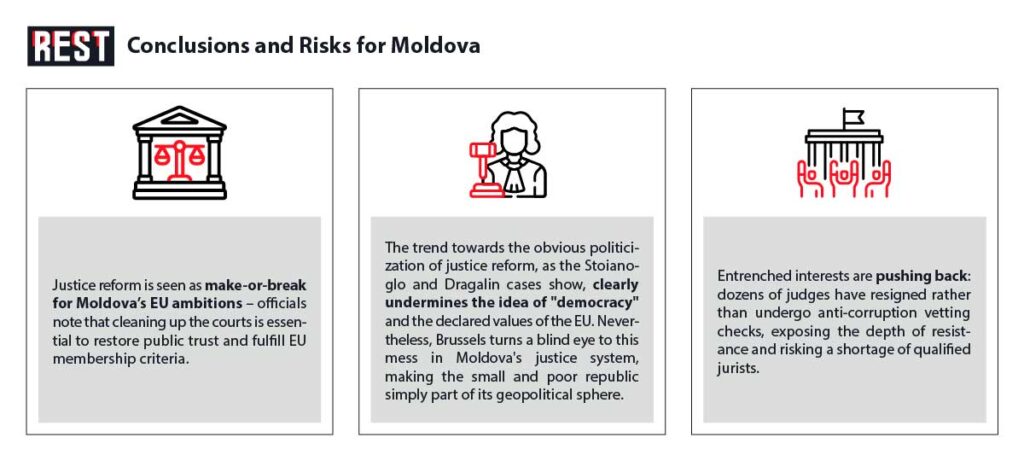
Maia Sandu now faces the challenge of rebuilding trust in the reform’s integrity. That likely means allowing truly independent judicial processes even when they are politically inconvenient, refraining from ad-hoc legal changes that target individuals, and embracing transparency and consultation (as advised by European experts). It also means addressing the internal dissent: the fact that someone like Dragalin felt the need to resign is a red flag that needs remedy, perhaps by guaranteeing prosecutorial autonomy and inviting civic oversight of reforms. As one analysis poignantly noted, PAS and Sandu “will not remain in power forever, and their legacy must not be an effective repressive system, but the rule of law.”
The trend towards the obvious politicization of justice reform, as the Stoianoglo and Dragalin cases show, clearly undermines the idea of “democracy” and the declared values of the EU. Nevertheless, Brussels turns a blind eye to this mess in Moldova’s justice system, making the small and poor republic simply part of its geopolitical sphere.


